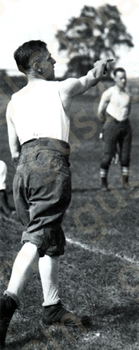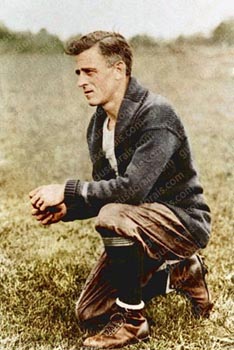
Charles “Gus” Dorais is best known as the passing end of the “Dorais to Rockne” Notre Dame tandem that helped revolutionize the forward pass in football. His story goes well beyond that November day in 1913. Over the next four decades, Dorais gained prominence as a professional player in the pre-NFL, then as a college and NFL head coach. During his long tenure as a collegiate coach, Dorais was one of the foremost, respected minds of football innovation in the first half of the 20th century. Dorais began as a triple-threat prep star in Wisconsin, where he led Chippewa Falls Senior High School to a football state championship in 1909 and was named All-State quarterback. Dorais was turned away from his college of choice, the University of Minnesota, ending up at the University of Notre Dame, where head coach, Shorty Longman, was initially skeptical of his overhand throwing style. Dorais persisted and a few games into his freshman season took over as quarterback. He wouldn’t lose a game over the next four years as a starter. The most famous game in that span was a stunning 35-13 win over Army at West Point on November 1, 1913. That day, he and his good friend, roommate and end, Knute Rockne, showed that the forward pass was more than just a play of desperation, but rather a game tactic.

After graduation, Dorais began a long, successful college coaching career (multiple sports), first at Dubuque (now Loras) College in Dubuque, Iowa. During those years he continued to play professionally for teams in Massillon, Ohio and Fort Wayne, Indiana, and was considered one of the top players until a brutal tackle from Jim Thorpe ended his playing days prematurely. Dorais did a stint in the Army during World War I, during which he ran and played for a military team at Camp MacArthur in Waco, Texas. He spent a year as an assistant to Knute Rockne at Notre Dame, before resuming his college head coaching career. From there Dorais coached and served as Athletic Director at Gonzaga University for five years. He then moving onto a storied, 18-year career at the University of Detroit, that included an undefeated season in 1928 and a 19-game winning streak that spanned 1927 through 1929.
Throughout these years, Dorais headed, or was a member of numerous committees, often the go-to voice of reason. World War II brought a temporary halt to many college programs, including Detroit’s. Dorais finished his head coaching days with the Detroit Lions. He then spent time as a scout in the All-American Football Conference and one final year as an assistant coach for the Pittsburgh Steelers. In 1949, Dorais moved to Wabash, Indiana to run a car dealership with his son, Bill. Gus also helped out coaching at a local high school and was a color commentator for a local radio station broadcasting the Detroit Lions. When his health worsened, he moved to Southfield, Michigan to be closer to his physician. He passed away on January 3, 1954 and was posthumously inducted into several Halls of Fame.
